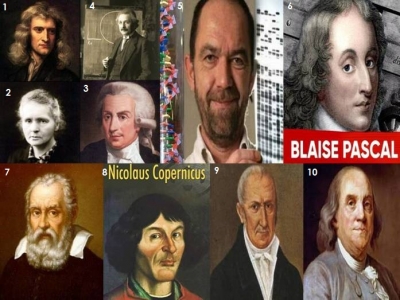
SCIENTISTS
Scientists study the Universe in order to find out how and why things happen. There are many different branches of science, such as physics, chemistry, and astronomy. Scientists make careful observations of the phenomena they are studying. They construct possible explanations for their observations, known as theories or hypotheses. Then they experiment to test whether their theories are accurate.
- SIR ISAAC NEWTON: English physicist and mathematician Newton (1642-1727) proposed the laws of motion that explain how forces move objects, and went on to devise a theory of gravity. Newton also studied optics, the science of light, and explained how white light is made up of many colours.
- MARIE CURIE: Marie Curie (1867-1934) was born in Poland, but carried out her investigations into radioactivity in Paris with her French husband, Pierre. She discovered the elements (substances) polonium and radium in 1898, and won two Nobel Prizes. Marie Curie died of leukaemia, probably due to long exposure to radiation.
- LUIGI GALVANI: Italian scientist Galvani (1737-98) studied the role of electrical impulses in animal tissue by experimenting on frogs. Although his theory that the electricity was coming from the animal tissue was wrong, his discoveries led to the invention of the battery by Alessandro Volta.
- ALBERT EINSTEIN: Einstein (1879-1955) was born in Germany but after Hitler came to power, he fled to the United States. Einstein revolutionized physics with his studies of relativity, which show how matter, energy, space, and time are connected. Einstein was awarded the Nobel Prize for Physics in 1921.
- ALEC JEFFREYS: British geneticist Jeffreys (born 1950) discovered that each individual has certain distinctive patterns of DNA and worked out how to make images of these DNA sequences. He pioneered DNA fingerprinting, used by forensic scientists in criminal investigations to identify people from traces of DNA.
- BLAISE PASCAL: Frenchman Pascal (1623-62) explored many practical applications of science and mathematics. He invented a mechanical calculator, a device made up of dials and gears, as well as a type of syringe. He also did experiments with air pressure.
- GALILEO: Italian astronomer and mathematician, Galileo (1564-1642) was the first person to use a telescope for studying the sky. He discovered the four largest satellites of Jupiter, today known as the Galilean moons.
- COPERNICUS: Polish astronomer Copernicus (1473-1543) is considered to be the founder of modern astronomy. His studies of the orbits of the planets revealed that the Sun is at the centre of the Solar System. At the time, the predominant view was that Earth was the centre of the Universe.
- ALESSANDRO VOLTA: In 1800, research into electric currents led Italian physicist Volta (1745-1827) to invent the battery. Volta’s battery or “voltaic pile” was the first reliable means of producing an electric current, and so made it easier to perform further experiments with electricity.
- BENJAMIN FRANKLIN: US statesman, writer, and scientist Franklin (1706-90) conducted research into electricity. He proved that lightning is an electrical current and suggested the use of lightning conductors to protect buildings from lightning strikes.
Picture Credit : Google




